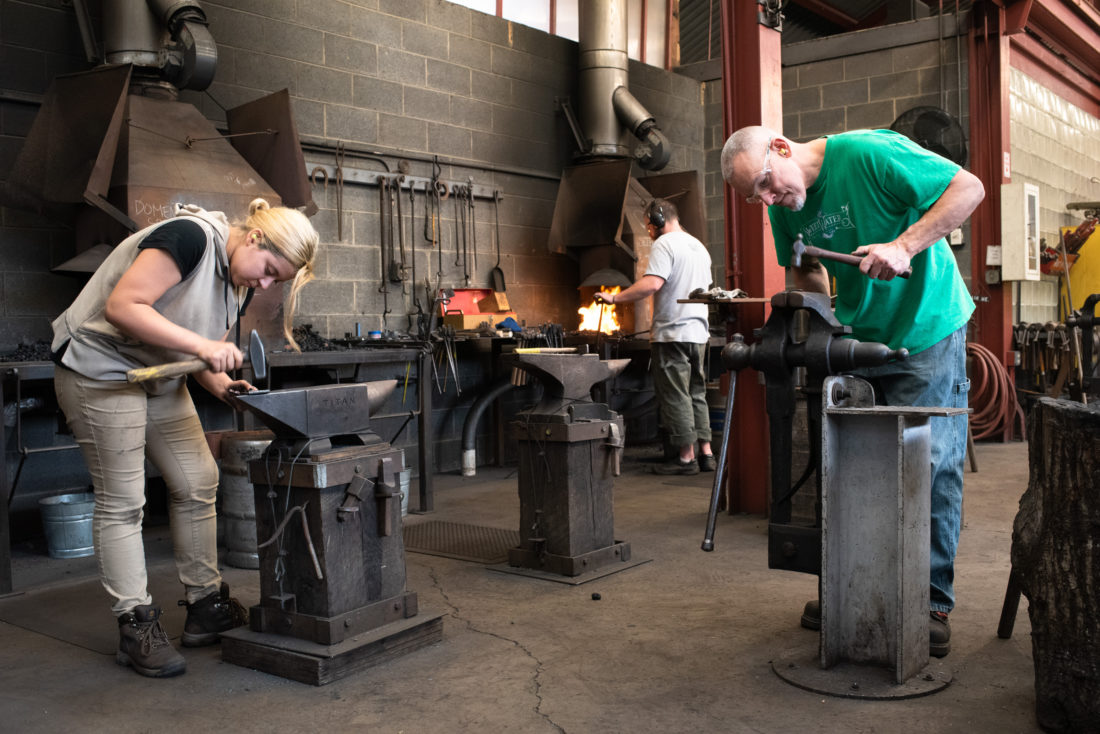The Penland School of Craft’s educational philosophy is based on such core ideas as “Total-immersion workshop education is a uniquely effective way of learning” and “Close interaction with others promotes the exchange of information and ideas between individuals and disciplines.”
But with restrictions stemming from the COVID-19 pandemic still in place, hands-on learning in close quarters remains impractical. Add to those challenges the fact that students and faculty come to Penland from around the world and that the rural Mitchell County health system could easily be overwhelmed, and it’s no surprise that Executive Director Mia Hall and her colleagues decided early on to cancel all workshops for this summer. Though Hall says Penland has rescheduled as many instructors who were going to teach this term as possible for the next few years, and next summer is almost fully planned out, implementing anything sooner wasn’t feasible.
“Trying to quickly change the format was not something we’re interested in,” Hall says. “We wanted to make sure we could guarantee a high-quality experience. With so little time to change that format, we didn’t want to just go online.”
Offering digital classes is also simply implausible for many courses from area craft schools. Hall notes that a mending class that utilizes fabric, needle and thread could work, but that few people have the necessary equipment to partake in metal casting, blacksmithing or woodworking.
“Our intuition initially led us to offer online paid courses, but it turns out everyone everywhere is offering online classes, and they are often doing so for free. When you can take a complete online neuroscience class from Harvard [University] for free, it may not be the time to offer a tuition-based online art-making class,” says Will Barclift, executive director of Tryon Arts & Crafts School.
“Our staff’s time is as valuable now as it was in February, so we do not want to spin our wheels trying to force our standard programs into a format that won’t work or a timeline that is unknowable due to the virus. So, our postponed workshops will remain postponed until a time when we can ensure the safety of our students and teachers as well as ensure the quality of the program.”
In the interim, craft schools are finding value in free online art demonstrations. The Penland staff is exploring that option, while Tryon currently offers them, plus kiln firing and clay takeout and delivery — providing a safe substitute for its clay studio — and virtual tours of the school. And at the John C. Campbell Folk School in Brasstown, monthly webinars focused on Appalachian craft and weekly MorningSong concerts are aired on Facebook Live, along with videos of “Farmer Teddy” Pitsiokos at work.
The absence of each school’s usual population has also allowed staff to get to projects that had been set aside for more pressing issues, as well as maintenance and upkeep of the grounds’ various buildings and green spaces.
“We are investing a lot of our energy in addressing our facilities wish list, technology upgrades, landscaping improvements and remodeling,” Barclift says. “When we reopen, we want to be better than when we closed.”
For now, funding at all three institutions is sufficient, though classes will eventually need to resume in order to remain financially afloat. According to Jerry Jackson, executive director of the folk school, individual donor giving is currently $100,000 above what it was this same time last year, and its Giving Tuesday Now campaign on May 5 raised $42,500.
Hall says that, a year and a half ago, Penland received a large endowment gift that’s proving “extremely helpful right now.” She and her staff have also applied for grants and received generous donations, along with many students gifting their summer tuition to the school. Similarly, Barclift reports that Tryon has received loans and advancement of grant funds that are helping offset its expenses into the summer, but he and his colleagues are researching emergency grant funding in case the entire summer schedule is canceled.
“We are discussing the possibility of increasing the number of classes at smaller sizes, allowing us to socially distance,” Barclift says. “We anticipate that we will take a hit financially as we phase back into our operations. But we will do what we have to do to regain our creative culture and in good health. The ends justify the means.”
The folk school is likewise in the process of evaluating the student experience and how it will be augmented to follow guidelines for safety and physical distancing in its common areas, dining hall, studios and student houses. Jackson notes that numerous students have been in communication with the staff and are expecting the school will make the necessary changes in order to reopen and continue to provide programs with physical distancing and safety measures in place.
“We’re hearing from several students who say they need the folk school now more than ever, and they are looking forward to returning in the future,” Jackson says. “A ‘Welcome Home’ sign hangs over the door of Keith House, our main house and central hub of our 270-acre campus. The idea for the sign came from a student and echoed the sentiments of many Folk School students who say the Folk School is their home away from home.”




Before you comment
The comments section is here to provide a platform for civil dialogue on the issues we face together as a local community. Xpress is committed to offering this platform for all voices, but when the tone of the discussion gets nasty or strays off topic, we believe many people choose not to participate. Xpress editors are determined to moderate comments to ensure a constructive interchange is maintained. All comments judged not to be in keeping with the spirit of civil discourse will be removed and repeat violators will be banned. See here for our terms of service. Thank you for being part of this effort to promote respectful discussion.